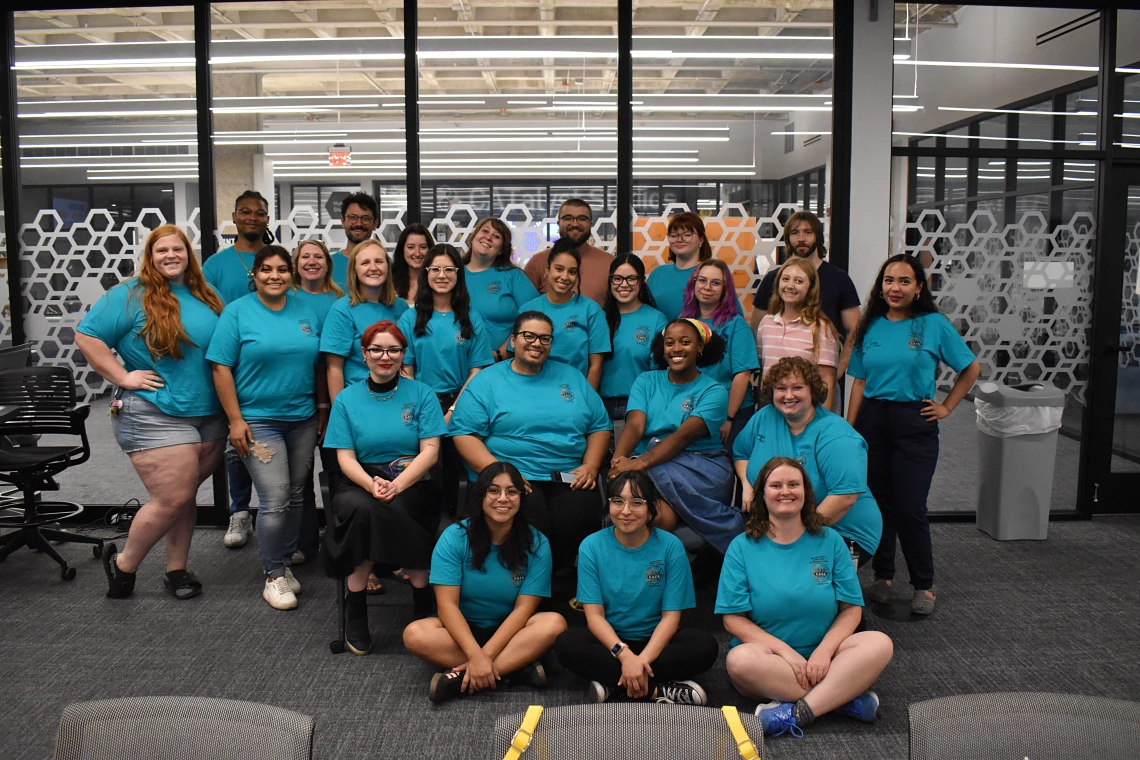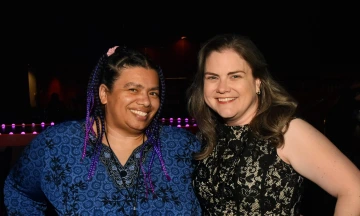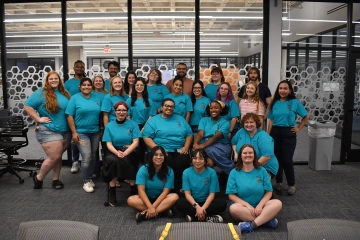Grad CAFE – A Holistic Approach to Graduate Student Mentorship and Community
In this article, we’ll explore the essence of Grad CAFE: what it offers, how it was created, students' experiences within the program, and our exciting plans for the future.

Grad CAFE – It’s a Vibe!
You may have seen students around campus wearing the Grad CAFE logo or heard friends mention it in passing, and now’s your chance to learn what it’s all about. In this article, we’ll explore the essence of Grad CAFE: what it offers, how it was created, students' experiences within the program, and our exciting plans for the future.
What is Grad CAFE?
Grad CAFE, or Graduate Communities for Academic Fellowship and Efficacy, is an NSF-funded program created to support graduate students from underrepresented and underserved backgrounds. This program offers a multi-tiered, strengths-based, holistic, intersectional, and interdisciplinary mentoring community. Co-directed by Dr. Celeste Atkins and Dr. Nicole Marrone, Grad CAFE provides a nurturing environment for graduate students to build professional skills, learn the hidden curriculum of graduate education, and find fellowship with peers and mentors across different disciplines.

Co-directors Dr. Celeste Atkins (left) and Dr. Nicole Marrone
The multi-tiered structure of Grad CAFE includes two co-directors, community leaders (graduate students who have completed their comprehensive exams), and peer mentors (first- and second-year PhD students). This structure offers students the opportunity to mentor each other, be mentored by students who are further ahead in their journey, as well as connect with faculty and staff. It’s all about creating a support network designed to help everyone feel more at home in the often-intimidating world of grad school.
Originally inspired by conversations between Dr. Atkins and Associate Dean of Student Affairs for Diversity and Inclusion Dr. Frans Tax, Grad CAFE was developed to help bridge gaps in mentoring and community that many underrepresented (racially minoritized, women in STEM, first-generation/low-income, disabled, queer/gender nonconforming) students experience in graduate school. These students often face additional challenges, such as higher rates of attrition after their first year, and longer time to completion. Through Grad CAFE, students find a safe, interdisciplinary space where they can build a community, access resources, and get the support they need to thrive.
Grad CAFE’s Food-Centered Community
A unique and meaningful aspect of Grad CAFE is its focus on food-centered gatherings, which help build community among participants. Food has a way of bringing people together, transcending cultural boundaries and creating a welcoming atmosphere. Many graduate students face food insecurity as a result of limited resources, while others find their packed schedules make it hard to find time to eat. Grad CAFE addresses these issues by providing hot meals at each weekly session, along with monthly "Cafecito" dinners. This approach is simple, but it has a huge impact—helping students feel at home, nurtured, and well-nourished as they dive into tough conversations or just catch up with each other.
How do participants describe Grad CAFE?
When asked about their experiences, students expressed how Grad CAFE has positively impacted their time in graduate school. One student summed it up as “community,” sharing that “Grad CAFE has given us [underrepresented graduate students] a space to open up, be ourselves, and get to know one another.” Another participant described it as “a form of mentorship through community, which is different from mentorship from advisors or PIs.” This unique mentorship style allows students to learn from each other’s journeys and feel more connected.
For community leaders, many of whom wished they had this type of support when they started grad school, Grad CAFE offers the chance to give back and foster a supportive environment, encouraging them to share experiences and learn from the peer mentors and other community leaders. This role also allows leaders to develop teaching, public speaking, and other skills that will help as they navigate the job market. In the future, we hope that peer mentors will return as community leaders.
The Friendships and Support Grad CAFE Builds

Current Grad CAFE Cohort (Fall 2024)
One of the most valued aspects of Grad CAFE is the friendships formed within the program. “Grad school is a lot and it’s a huge time commitment,” one student shared. “Because we have a dedicated space to gather and spend time together across programs and departments, it makes it worth it to show up and has allowed us to support each other.” Grad school doesn’t naturally lend itself to cross-disciplinary friendships, so having a dedicated place like Grad CAFE to connect with people outside of one’s academic program has been invaluable.
Another highlight for students is the monthly Cafecitos. “It’s high energy, and it really helps cultivate a space for grad students to grow community,” one student said. “We get to eat food, laugh with friends, and be in a space where we can not only be ourselves but also feel loved and supported by our peers.” For many, these gatherings provide a much-needed opportunity to unwind. “The Cafecitos provide us with a space to just relax, be silly, and have fun,” said another participant. Cafecitos also provide an opportunity to network with invited faculty, staff, and alumni.
When asked if they would recommend Grad CAFE to prospective students, participants were enthusiastic. One student said, “If you feel like you are missing community in your life as a grad student—this is a good place to start.” Another shared, that grad school is different from undergrad, where community was more built-in with mandatory events, classes, and dorm life. “In grad school those intentional spaces aren’t embedded into our experience, so if you’re missing that sense of belonging, Grad CAFE is a great place to find it.” The program offers a safe space where students can ask questions, seek advice, and navigate grad school with support from others who understand their struggles.
One first-generation student reflected on how Grad CAFE helps with the "hidden curriculum" of grad school – the unspoken rules and norms that aren’t explicitly taught in class. “Oftentimes, if you are from an underrepresented community, you may have questions about things that seem obvious to others and be too nervous to ask others in your cohort. For example – a lot of my friends have parents who went to grad school, but I am a first-gen student, and my friends and family don’t know how to navigate higher education or my area of research. I was really timid to ask questions. … Grad CAFE is a safe place to ask those questions, and I’ve never been made to feel like my question was dumb or something I should already know.”

Students gathered at the Graduate Center for a class session.
Plans for Grad CAFE’s Future
This year, Grad CAFE received the National Science Foundation’s Innovations in Graduate Education Track 2 grant for $1 million, to be used over the next five years. With this funding, the program plans to expand from 72 students to 256 by building upon the student-led, community model. This growth will allow Grad CAFE to support students from the early stages of their PhDs all the way through to completion. Dr. Atkins shared that the program aims to expand beyond STEM to include more interdisciplinary groups, with a goal to create a sustainable model that can change the culture of mentoring at the University of Arizona and beyond. To this end, the team is developing a Grad CAFE blueprint that other institutions can adapt to create supportive communities on their campuses.
Join Grad CAFE in the spring
Recruitment for the Spring 2025 cohort is already underway. First- and second-year doctoral students interested in joining can expect a commitment of about three hours per week. To learn more, visit our website, watch our promotional video, or drop by the Graduate Center for Grad CAFE Study Hall, open to all graduate students on Wednesdays from 1 PM – 3 PM.
Grad CAFE is a space for graduate students to find belonging, support, and growth. Fill your cup, be yourself, enjoy good food, and make lasting connections with people who understand the challenges you’re facing. Grad CAFE—it really is a vibe!
Apply now for Spring 2025.

